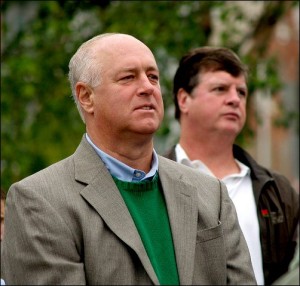As if he didn’t already have enough to do, Philadelphia St. Patrick’s Day parade director Michael Bradley, Jr., is taking on a daunting new assignment. He is the chairman of a relatively new board that will oversee all 23 Catholic schools in Delaware County.
Bradley holds leadership positions in a number of organizations, including Penn State’s Board of Advisers. He also happens to be president of a family-owned flooring and wall protection company.
Busy or not, Bradley doesn’t mind a bit. In fact, he has been lobbying for a role in county schools ever since a Blue Ribbon Commission issued a report in January 2012 calling for some predictably unpopular choices. Faced with a 38 percent drop in enrollment and a staggering $6 million deficit, the commission ordered the closure of 45 of the Archdiocese’s 156 elementary schools and four of 17 high schools.
Twenty-four elementary schools appealed, and 18 earned a reprieve. All four high schools also were spared the chopping block thanks to millions of dollars in pledges and donations.
Nevertheless, parents and communities reacted with alarm, and no small degree of anger, to the commission’s findings.
“They were closing all of these schools,” he says. “The main thing I told them is, you can’t have one group in charge. I was badgering them about it enough so that they looked at it. I was not the only one, but I was at the forefront of the screaming. They agreed with me. They came up with a plan to name advisory boards to run the counties. People just want to be heard. Bringing it all down into more manageable units is better.”
In Bradley’s case, it was never a question of “be careful what you wish for.” A leadership role on the Delaware County advisory board was exactly what he wanted.
“It’s a challenge, and a really neat thing,” he says. “I find it rewarding to build things up from scratch—rather than complain about it, to come up with solutions. I love Catholic education. I live Catholic education. I enjoy the heck out of it because I enjoy the kids.”
Bradley says the immediate plan is to put the schools on more of a business footing, and to unite them in the quest for financial stability and higher enrollment. Stronger involvement on the part of the business community is also a key element.
“Every school has been left on its own. They weren’t sharing information. That’s crazy. It’s important to share, and give them direction on how to raise money. There’s government money out there for them. It’s available.”
Bradley harbors no illusions that every Delaware County school will survive. There are some tough decisions ahead. But for now—and probably long into the future, knowing Bradley—the advisory board is accenting the positive. Rather than talking about which school is going to close, he says, the focus now remains on how to keep them open.
It’s a tough job, but in the end, each school has to solve two problems. “They need money, and they need kids,” Bradley says. “That’s it. You solve those problems, and all the other problems solve themselves.”


